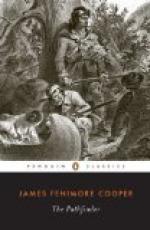Mabel sprang up on the shore with a delight which she did not care to express; and her father led his men after her with an alacrity which proved how wearied he had become of the cutter. The station, as the place was familiarly termed by the soldiers of the 55th, was indeed a spot to raise expectations of enjoyment among those who had been cooped up so long in a vessel of the dimensions of the Scud. None of the islands were high, though all lay at a sufficient elevation above the water to render them perfectly healthy and secure. Each had more or less of wood; and the greater number at that distant day were clothed with the virgin forest. The one selected by the troops for their purpose was small, containing about twenty acres of land, and by some of the accidents of the wilderness it had been partly stripped of its trees, probably centuries before the period of which we are writing, and a little grassy glade covered nearly half its surface.
The shores of Station Island were completely fringed with bushes, and great care had been taken to preserve them, as they answered as a screen to conceal the persons and things collected within their circle. Favored by this shelter, as well as by that of several thickets of trees and different copses, some six or eight low huts had been erected to be used as quarters for the officer and his men, to contain stores, and to serve the purposes of kitchen, hospital, etc. These huts were built of logs in the usual manner, had been roofed by bark brought from a distance, lest the signs of labor should attract attention, and, as they had now been inhabited some months, were as comfortable as dwellings of that description usually ever get to be.
At the eastern extremity of the island, however, was a small, densely-wooded peninsula, with a thicket of underbrush so closely matted as nearly to prevent the possibility of seeing across it, so long as the leaves remained on the branches. Near the narrow neck that connected this acre with the rest of the island, a small blockhouse had been erected, with some attention to its means of resistance. The logs were bullet-proof, squared and jointed with a care to leave no defenceless points; the windows were loopholes, the door massive and small, and the roof, like the rest of the structure, was framed of hewn timber, covered properly with bark to exclude the rain. The lower apartment as usual contained stores and provisions; here indeed the party kept all their supplies; the second story was intended for a dwelling, as well as for the citadel, and a low garret was subdivided into two or three rooms, and could hold the pallets of some ten or fifteen persons. All the arrangements were exceedingly simple and cheap, but they were sufficient to protect the soldiers against the effects of a surprise. As the whole building was considerably less than forty feet high, its summit was concealed by the tops of the trees, except from the eyes of those who had reached the interior of the island. On that side the view was open from the upper loops, though bushes even there, more or less, concealed the base of the wooden tower.




